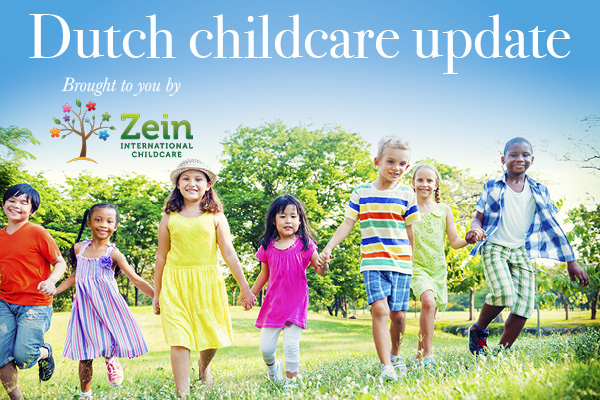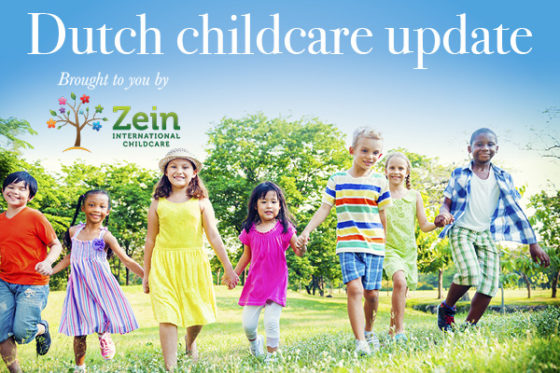Partner content
Childcare news: BSOs reopen, May holiday plans and bilingual care

 A round up of the latest Dutch childcare news, brought to you by Zein International Childcare.
A round up of the latest Dutch childcare news, brought to you by Zein International Childcare.
After school care (BSO) is open again
The government announced last week it would reopen after school childcare and holiday care facilities (BSO) from Monday for primary school pupils, as long as strict hygiene and other protocols are observed. The move is the next step in the slow return to normality in the Netherlands, and one which has been widely welcomed by parents and children alike. While primary schools had reopened on February 8, BSO operations remained closed to all but the children of essential workers.
‘We were taken a little by surprise but we are delighted to be able to open our doors to all our children again,’ says Thanos Papanastasiou, of Zein International Childcare, which provides after school services at six locations in and around The Hague.
‘After school care gives children the chance to socialise,play and relax with their peers after a long day at school. As we welcome the children back, we are delighted to see them make new friends and strengthen existing bonds in a safe, fun-filled environment.’
Childcare allowance calculator
Don’t forget, in the Netherlands almost all families where both parents (or a single parent) are working or studying are entitled to the government’s childcare allowance when using formal registered childcare – irrespective of nationality or length of stay. Even if you are registered and holding a BSN number (Burger Service Nummer) but do not pay tax in the Netherlands, you may still be eligible for the refund. Find out more. Zein International Childcare also has a handy childcare benefit calculator so you can see how much you may be entitled to.
The government will also provide additional compensation to families for the period when childcare was closed because of the lockdown. Find out more about when and how to claim the cost back.
Explaining coronavirus to the kids
If you are looking for a simple way of explaining the pandemic to children, Gruffalo illustrator Axel Scheffler has helped put together a digital book for primary school age children all about the coronavirus and the measures taken to control it. You can download a pdf or read it online, and there is even an audio version. The book is free, but you can make a donation.
Coronavirus testing
Testing is one of the key parts of the government’s strategy to reopen society again, and that means children can now also go through the process when displaying symptoms or following contact with someone who has been infected.
As a precaution, children aged 0-3 years old should not attend day care or pre-school care in case of a fever, shortness of breath or frequent coughing. Children aged 4-12, should not attend school or after school and holiday care with any symptoms fitting corona, including cold-like symptoms. Parents have the option to wait until their child is symptom-free for 24 hours, or have their child tested. Your family doctor can help you make a decision.
The Dutch public health institute RIVM has made a special video, in English, which explains in simple language for children how coronavirus spreads and testing works.
Looking for forward to the May holidays
The May school holidays are almost with us and now that foreign travel is not an option, many families are wondering how to spend their spring break.
Earlier this month, the Dutch tourist board said that short breaks in the Netherlands are proving an attractive option, with four in 10 people in the Netherlands plan a staycation this year, and half not going abroad until everyone has been vaccinated. Holiday parks are allowed to open, although indoor pools and play halls will be closed, and you’ll have to cook for yourself or settle for a takeaway.
That doesn’t mean your kids have to be bored though. Zein International Childcare will be running its popular programme of holiday camps again this year in both the May and the summer holidays. The May holiday programme includes arts and crafts, super heroes and even some space exploration for four to 12 year olds. The camps run simultaneously with the holidays of all key international and Dutch schools in The Hague, on week days from 8am to 6.30pm
Families are not tourism
If your kids are missing their grandparents and you still have no idea when you can all get together again, you might be interested in a new initiative which is trying to persuade politicians that foreign travel is not just about holidays abroad.
The Netherlands is believed to be one of the strictest countries in Europe in denying entry to mothers, fathers, children and grandparents of Dutch residents. Now campaigners are lobbying the government to recognise the European list of reasons for ‘imperative family reasons’ for visits, rather than its blanket ban on travel from some countries and are asking people to share their stories with the #alsjeblieftnederland hashtag.
If you do have a family visit planned, you should also be aware that is it likely the Netherlands will introduce compulsory quarantine for everyone arriving from an orange or red zone country from mid May.
Childcare in two languages
Following strong demand, Zein International Childcare has started offering bilingual daycare and after school care in both Dutch and English across multiple locations across The Hague and Voorburg. The aim is to familiarise children with both languages, enabling them to learn them in parallel. The groups have at least two teachers – one speaking Dutch, one English, and the daily schedule integrates the two so that children are exposed to each language.
Research shows that children raised to speak more than one language are more open-minded, have better problem-solving skills, adapt better to different environments and pick up new languages easier
‘Children pick up the languages very quickly,’ says teacher Christina. ‘I also hear stories of children helping their parents to translate something from Dutch to their mother tongue while shopping!’
Zein launched bilingual daycare and after school care groups in response to requests from both long-stay expat families and internationally-minded local families who increasingly recognise the benefits of a bilingual upbringing. Find out more
Thank you for donating to DutchNews.nl.
We could not provide the Dutch News service, and keep it free of charge, without the generous support of our readers. Your donations allow us to report on issues you tell us matter, and provide you with a summary of the most important Dutch news each day.
Make a donation